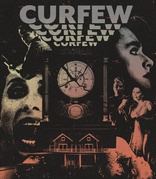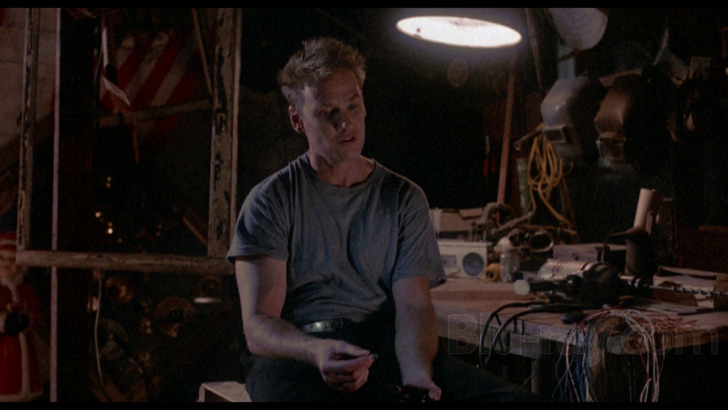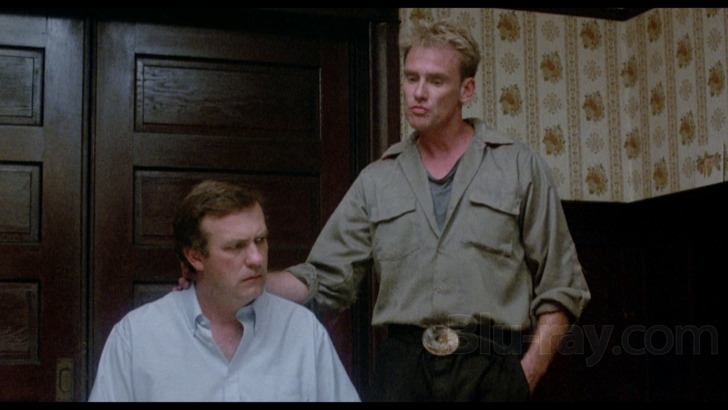Curfew Blu-ray Movie
HomeCurfew Blu-ray Movie 
Vinegar Syndrome | 1989 | 86 min | Not rated | Feb 22, 2022
Movie rating
5.5 | / 10 |
Blu-ray rating
| Users | 0.0 | |
| Reviewer | 4.0 | |
| Overall | 4.0 |
Overview
Curfew (1989)
Two escaped brothers track down the people who sentenced them to death row, including a doctor and the judge. But when they get to the D.A. and his family they have an especially lengthy revenge plot in mind for them.
Starring: Kyle Richards, Wendell Wellman, John PutchDirector: Gary Winick
| Horror | 100% |
Specifications
Video
Video codec: MPEG-4 AVC
Video resolution: 1080p
Aspect ratio: 1.85:1
Original aspect ratio: 1.85:1
Audio
English: DTS-HD Master Audio 2.0
Subtitles
English SDH
Discs
Blu-ray Disc
Single disc (1 BD)
Playback
Region free
Review
Rating summary
| Movie | 2.5 | |
| Video | 4.0 | |
| Audio | 4.0 | |
| Extras | 4.0 | |
| Overall | 4.0 |
Curfew Blu-ray Movie Review
Reviewed by Brian Orndorf February 22, 2022Gary Winick (who passed away in 2011) was never a consistent filmmaker, but he found his way into the Hollywood machine, delivering entertainment offerings such as “Charlotte’s Web,” “Letters to Juliet,” “Bride Wars,” and his best endeavor, “13 Going on 30.” He was a vanilla helmer working with simplistic screenplays, but it wasn’t always that way for Winick. He started his career in exploitation, following the career path of many by focusing on the sellable power of horror. 1989’s “Curfew” is Winick’s directorial debut, and he takes on the basics in awful business with this “Funny Games” and “Cape Fear”-style exercise in revenge and torture, pitting a family held hostage against captors who have a little more on their mind than standard criminal activity. “Curfew” is crudely constructed and performed, but that seems to be what Winick is going for, sustaining the aesthetic of drive-in cinema to the late 1980s, though he’s not seasoned enough to deliver enough shocks and suspense, making the viewing experience more wearisome than worrisome.

District attorney Walter (Frank Miller) and his wife, Megan (Jean Brooks), are on their way out of the house for a three-day getaway, leaving their teenage daughter, Stephanie (Kyle Richards), with caretaker Mary (Peggy Rae). Stephanie takes off for a night on the town with her friend, Monica (Nori Morgan), who’s arranged a rendezvous with adored quarterback John (Peter Nelson), who’s ready to deflower his date in the back of his car. Refusing such a sexual adventure, Stephanie tries to make it back home before curfew, only to realize her parents are gone. Arriving at the residence in the middle of the night are Ray (Wendell Wellman) and Bob (John Putch), two convicts who’ve managed to escape from death row, returning to the town to seek revenge on all those who put them behind bars. This includes Walter, who’s pulled into a sick game of power and intimidation as the brothers figure out how to inflict as much pain as possible on their captives.
Written by Kevin Kennedy, “Captive” leads with the bad instincts of adolescence, highlighting Stephanie’s act of rebellion, leaving the house in rumpled overalls, quickly shedding the disguise to reveal a more provocative outfit for date night with John. Local folks don’t approve of her choice in clothing, which goes against their conservative community. Tight clothes turn out to be the least of Stephanie’s problems on this night, soon encountering a handsy monster in John, who demands sex from his new girlfriend, and there’s Ray and Bob, two vicious criminals who feel they’ve been wronged by the system, finding a way out of prison to exact revenge on those who’ve tried to destroy their lives. “Curfew” covers the brothers and their path to Walter’s house, confronting their enemies, showing them no mercy as Ray delights in tormenting his victims, while Bob, the simple one, helps to the best of his ability.
“Curfew” introduces an exasperated diner owner (Robert Romanus) and a dumb cop (Christopher Knight), but it mostly takes place inside Walter’s house, where the man of law and his wife are collected and restrained, soon joined by Stephanie after she returns home. The screenplay sets up Ray’s mission to humiliate and destroy the family, arranging a series of torture challenges, making Walter walk on broken glass and treating Megan to a spray paint makeover before assaulting her in a bathtub. “Curfew” isn’t disturbing enough to make these moments count, but something a bit more unsettling arrives with Bob’s attraction to Stephanie – a situation that reflects the violence that originally put the brothers behind bars. We learn more about the crime as the story unfolds, understanding Bob’s psychological issues, while Ray goes the psychopath route, delighting in the chaos he’s bringing to the evening.
Curfew Blu-ray Movie, Video Quality 

The AVC encoded image (1.85:1 aspect ratio) presentation for "Curfew" is sourced from a 2K scan of the 35mm interpositive. There's some level of softness to the viewing experience, but the grungy details of the production still emerge, highlighting wounds, tattered clothing, and facial wear and tear as torturous acts arrive. Household decoration is appreciable, even with limited lighting, and exteriors retain depth. Colors are satisfactory, highlighting period costuming (including Stephanie's light blue acid washed miniskirt and pink top), and diner lighting brings out livelier hues. Home invasion sequences register colder, broken up by displays of red blood. Delineation is acceptable, losing nothing to solidification. Grain is heavy but film- like. Source is in decent condition, with some light scratches and visible reel changes.
Curfew Blu-ray Movie, Audio Quality 

The 2.0 DTS-HD MA mix provides an acceptable understanding of dialogue exchange, working with the feature's limited budget and technical expertise. Emotional offerings aren't shrill. Scoring selections support as necessary, balancing a synth sound with violent activity. Sound effects register as intended.
Curfew Blu-ray Movie, Special Features and Extras 

- "Mind Games" (17:58, HD) is an interview with actor Wendell Wellman, who traces his interest in acting, making his way to a UCLA class where he fell in love with performing. Struggling to get his career going, Wellman remained in film, pushed out of T.V. opportunities, but this rejection inspired a screenwriting career, breaking through with 1982's "Firefox," impressing Clint Eastwood along the way. Hired for "Curfew" after a meeting with director Gary Winick, Wellman went deep into character, trying to make sense of the "nutso" he was assigned to play, going method during the two-week shoot. Co-stars are remembered by the interviewee, who also shares his fondness for Winick, encouraged by the helmer's level of trust in his abilities. Alas, "Curfew" did nothing for Wellman's career, skipping any major release, with the actor regarding the experience as a missed opportunity.
- "Still Scary" (13:36, HD) is an interview with editor Carole Kravetz Aykanian, who initially attended the AFI filmmaking program with director Gary Winick, who elected to fill the crew of "Curfew" with graduates and friends. Memories of Winick and his collaborative ways are shared, and the interviewee details her process in the editing room, reminding viewers that cutting movies back then isn't the same as today, noting the evolution of technology. With "Curfew" her first picture, Aykanian jumped into a regular gig, going from school to Hollywood as her career took shape almost immediately.
- And a Theatrical Trailer (1:35, SD) is included.
Curfew Blu-ray Movie, Overall Score and Recommendation 

Winick has moments of aggression and intimidation to develop, but there's not a lot of suspense to "Curfew." The screenplay is often caught in speech mode with Ray, and the supporting players are a collection of unlikable knuckleheads, almost justifying the villains and their plans for punishment (the football boys are real no-means-yes fiends). Winick doesn't provide snappy thriller moments, trapped in the inherent ugliness of the material, which is primarily focused on people suffering for 90 minutes. The helmer doesn't have the budget for style, keeping the endeavor rudimentary with average performances that can't break away from the banality of the writing. "Curfew" plays like material created in the 1970s that has to deal with genre demands of the 1980s, and Winick just doesn't have the experience to make something special out of a whole mess of ickiness.
Similar titles
Similar titles you might also like
(Still not reliable for this title)

Father's Day
2011

3 from Hell 4K
2019

Bound to Vengeance
2014

No One Lives
2012

Morituris
Legions of the Dead
2011

Friday the 13th
Killer Cut
2009

Martyrs
2015

Would You Rather
2012

The Last House on the Left
2009

The Last House on the Left
1972

Green Room
2015

Halloween 4K
2018

Leatherface
2017

Wolf Creek 2
Uncut
2013

Raze
2013

American Mary
2012

Texas Chainsaw 3D
2013

Otis
Uncut
2008

Joy Ride 3: Roadkill
2014

I Spit on Your Grave
Unrated
2010
